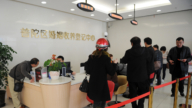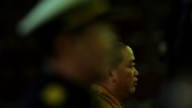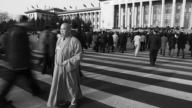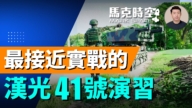【新唐人2015年01月17日讯】近一段时间以来,大陆养老金问题再次成为网路热门话题,养老金“并轨”政策终于出台。这意味着近四千万机关事业单位人员,将告别“免缴费”时代,和企业职工一样缴纳养老金。然而养老金“并轨”后,能否真正的消除“待遇差”?公务员的退休待遇是否会受到影响?机关事业单位的养老金钱从哪来等一系列问题,成为舆论探讨的焦点。
据中共官方网站消息,中共国务院1月14号正式对外发布《关于机关事业单位工作人员养老保险制度改革的决定》(以下简称“改革”),文件中明确规定,从2014年10月1号开始,政府机关、事业单位建立与企业相同的基本养老保险制度,实行单位和个人缴费。单位按工资总额的20%缴纳养老保险,个人按工资的8%缴纳,与企业职工比例相同。
多年来诟病不断的养老金“双轨制”终于被明令“废除”,公务员从不交一分钱就可以拿到相当于退休前工资90%的退休金,变成了和企业职工一样,要拿出工资的8%缴纳养老保险,这是否意味着和企事业职工之间不公平的“待遇差”从此缩小了呢?
众多专家学者表示,公务员们的退休待遇并不会因此降低,因为政府利用其他方式,“弥补”了公务员个人缴纳养老保险的“损失”。第一种公认的“补偿”方式就是涨工资。
美国中文杂志《中国事务》总编辑伍凡:“现在有一批要退休的国家机关的事业单位人员,要先提薪水、提工资,完了再退休。它的目的要保障这些人退休以后的退休金不降低。”
据官方媒体报导,人力资源和社会保障部在对“改革”解读中明确,养老保险制度改革与完善工资制度同步推进,在实行公务员个人缴费的同时增加工资。因此业内人士普遍认为,这也就意味着,从去年10月1号起个人需要补缴,工资增长也将同时进行,而且很可能增长的幅度还会高于需要补缴的费用。
而早在官方的这份“改革”出台前,中国人民大学老年学研究所副所长姜向群就曾提出,缴费的同时工资也将上涨。相关人士还透露,涨工资的经费,或将由国家财政和地方财政共同承担。
伍凡:“这个政权,它们主要保护的是谁?保护中共政权本身。政权本身不是个空架子,政权本身有一大批工作人员,这些工作人员大部分都是共产党,他们给共产党卖命一生了,最后走的时候希望有好的待遇,所以共产党为了要让政权稳定,让以后的政府工作人员给它们卖命,那么要在退休金上面给他们另外的补偿,或者一个保障。”
除了涨工资以外,第二种弥补方式,就是“职业年金”。所谓职业年金,是指公职人员的补充养老保险,是一项单位福利制度,由事业单位和职工共同缴费,又被民间称为“变相福利”。
最新公布的“改革”明确要求,机关事业单位在参加基本养老保险的基础上,应当为工作人员建立职业年金。单位按本单位工资总额的8%缴费,个人按本人工资的4%缴费。公务员退休后按月领取职业年金。也就是说,并轨之后,机关事业单位的退休金将采取“基本养老金+职业年金”的模式。
有数据显示,公务员退休后可领到的职业年金,最低可以达到在职工资的20%,而企业职工,则与这项福利无缘。这意味着由于年金的差距,企业与机关事业之间的实际养老待遇,依然十分悬殊。老百姓盼望20年,等到的所谓“并轨”竟然只是“制度并轨”而不是“待遇并轨”。
那么政府机关、事业单位为公务员缴纳的20%基本养老金,加上8%职业年金,资金从哪里来?当然还是国家财政拨出,也就是花的纳税人的钱。
对此网民们气愤的质问当局:所谓的“并轨”竟然是纳税人的负担更重了,不但要承担公务员的养老金更要承担职业年金,而普通百姓与公务员的退休待遇差却更大了,这样的“取消双轨”有什么意义?
采访/易如 编辑/张天宇 后制/舒灿
Pension Reform Hides “Dual Treatment”
China’s pension reform will eliminate the dual-track system.
That means 40 million civil servants will lose the exemption
from paying into their retirement funds.
Will the reform really eliminate the benefit gap between
public employees and the corporate employees?
Will the civil servants’ retirement benefit be affected?
How will the civil employee contribute to their pension plan?
These have caused much discussion on the Internet,
and caused concerns to public opinion.
The Communist State Council issued the pension reform
decision on Jan. 14.
Starting from Oct. 1, 2014, government agencies and public
Institutions will conduct the same basic retirement insurance
system and contribution as the corporate one.
That is the public sector and the employees will pay
into the funds respectively.
The employers will contribute 20% while employees
will contribute 8% of their salary to the pension fund.
This reform has finally removed the dual-track pension system
that’s much criticized over the years for the public servants
paying nothing into retirement but receive pensions equivalent
to 90% of their pre-retirement salary.
But, now the reform requires public servants to pay 8%
of their salary into the retirement.
Does that mean the unequal treatment between
the public sector employees and the private industry
employees has been minimized?
Many experts and scholars don’t believe the public servant’s
retirement benefit was reduced.
In fact, the government will compensate the loss
with different means.
A salary raise is generally believed to be the first
means of compensation.
China Affairs magazine editor-in-chief Chris Wu: There will
be salary increases to a number of to be
retired government personnel.
The purpose is to ensure that their pay after retirement
is maintained at the same level.
According to official media reports, the Ministry of Human
Resources and Social Security explained that both pension
reform and wage system improvement will be conducted
at the same time.
This will implement the public servant’s individual
contribution and salary raise.
It is generally believed that while individuals are required
to pay what’s overdue since Oct. 1, the salary
raise will happen.
The growth of salary is also anticipated to be higher
than what is overdue.
Jiang Xiangqun, vice-director of the institute of gerontology,
Renmin University of China, had proposed to increase salary
while contribution is required.
Sources also revealed that funding of increased salary
will be shared by both state and local governments.
Chris Wu: Who does this regime protect?
It is the regime itself.
The regime is filled with a large number of staff,
mostly the Communists.
After devoting themselves to the party for their life time,
they expect good treatment before they leave.
To maintain the stability of the regime so that the following
staff will continue to work for the regime, the retirement
funds will be compensated or guaranteed.
The second make up approach is the occupational pension.
It is a supplementary pension insurance for the civil servants.
This welfare is contributed by the employer and the employee.
It is generally referred as a ‘disguised’ welfare.
The pension reform specifically required employer to
contribute to both retirement pension
and occupational pension.
The occupational pension is contributed by the employer
at 8% of the salary and by the employee at 4%.
After retirement, the civil servant will receive
a monthly occupational pension.
That means, after the pension reform, the civil servants’
pensions will include both basic pension
and occupational pension.
It was analyzed that the occupational pension can reach 20%
of the base salary minimum.
But, corporate employees don’t share this benefit.
That means the annuity gap between the private industry
and the public sector is still very big.
The much awaited one pension system for the past 20 years
has finally been realized, but only in the system,
not in the exact treatment.
So where does the budget for 20% contribution to the
retirement pension and the 8% to the occupational
pension come from?
Of course, it is from taxpayers, allocated by the state.
In response, netizens angrily questioned the authority:
the so-called pension reform only causes even heavier burden
on taxpayers, who will pay for the public servants
not just the retirement but also the occupational pension.
The treatment gap between civil servants
and the general public is even bigger.
What’s the point of abolishing the dual-track pension system?
Interview/ YiRu Edit/ Zhang Tianyu Post-Production/ ShuCan






























